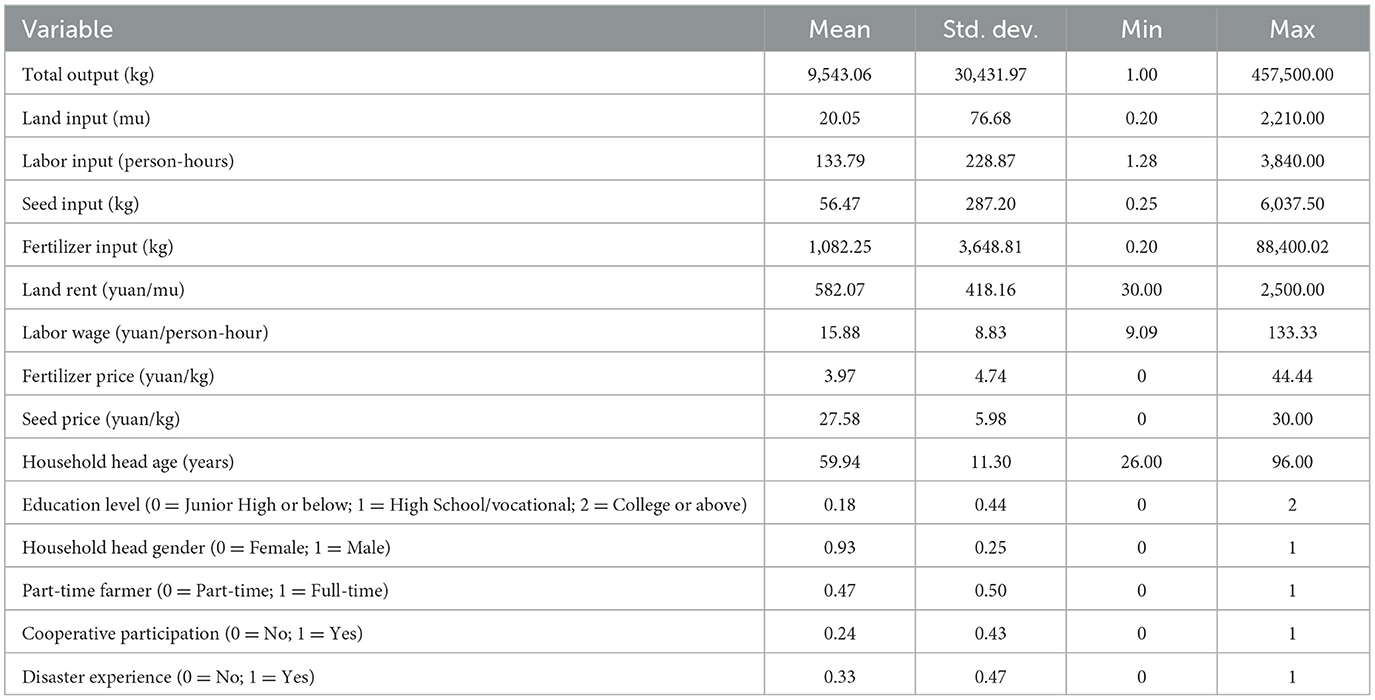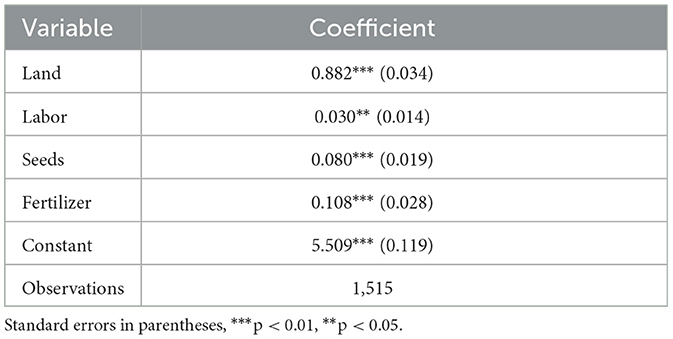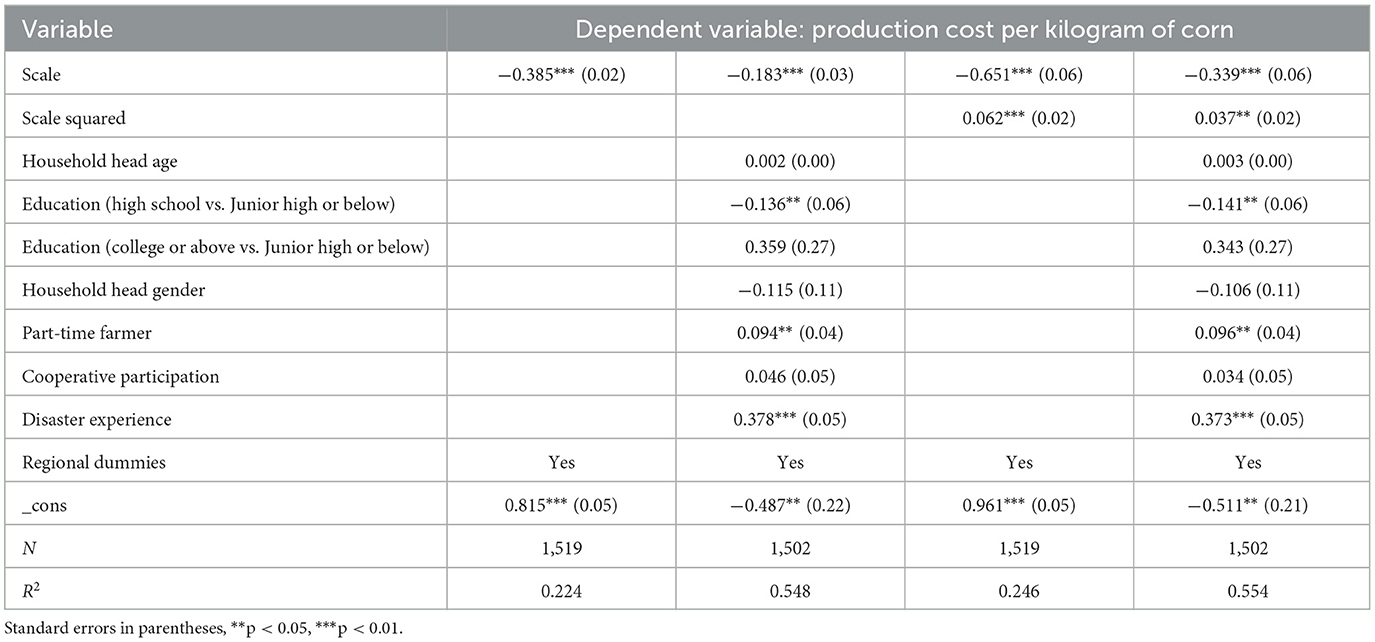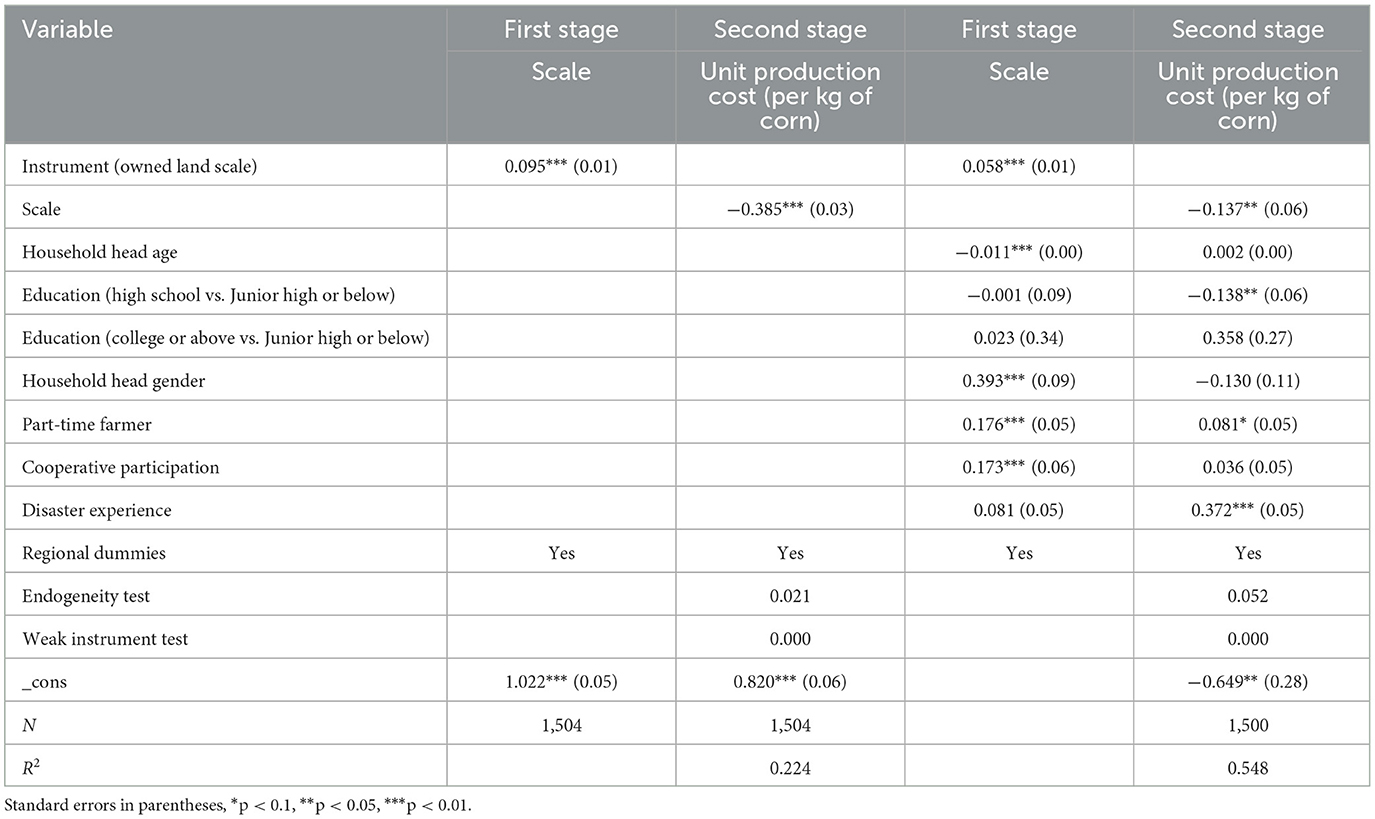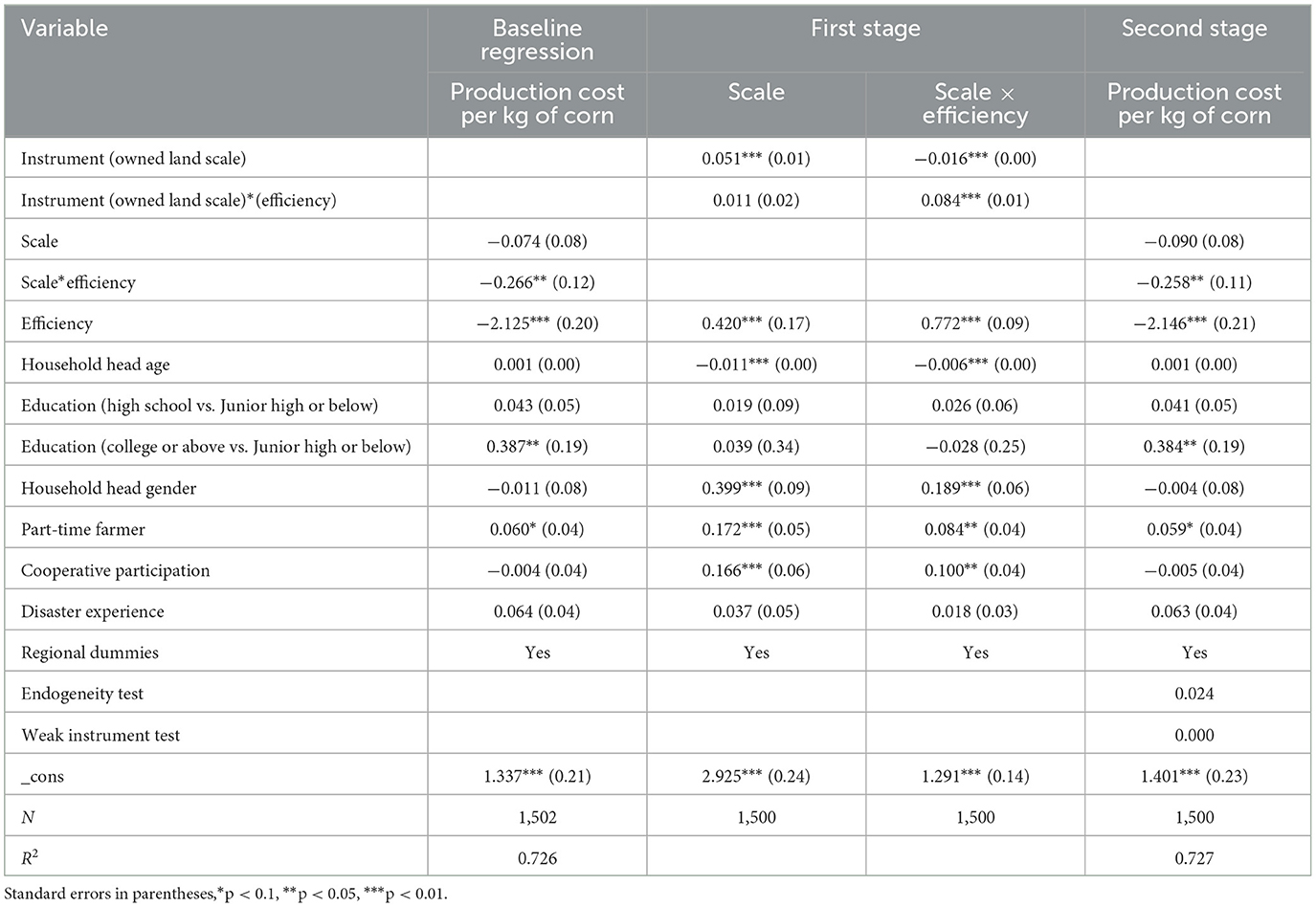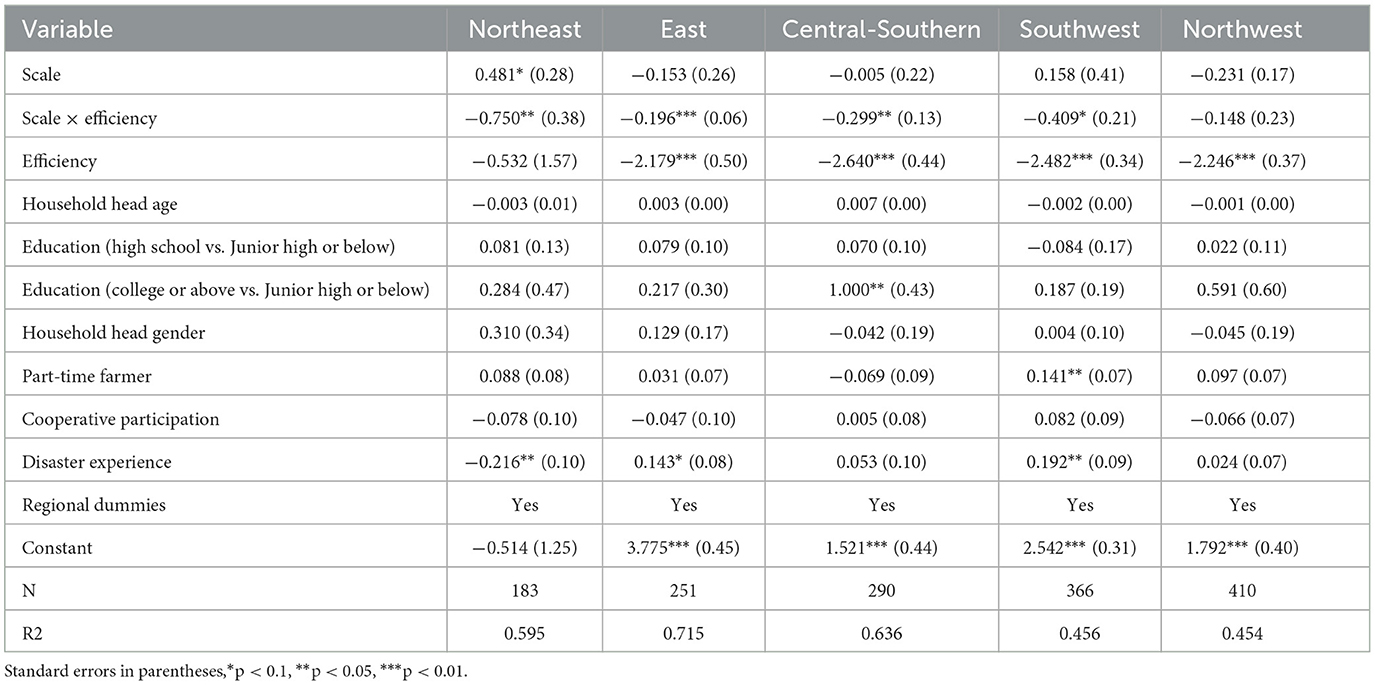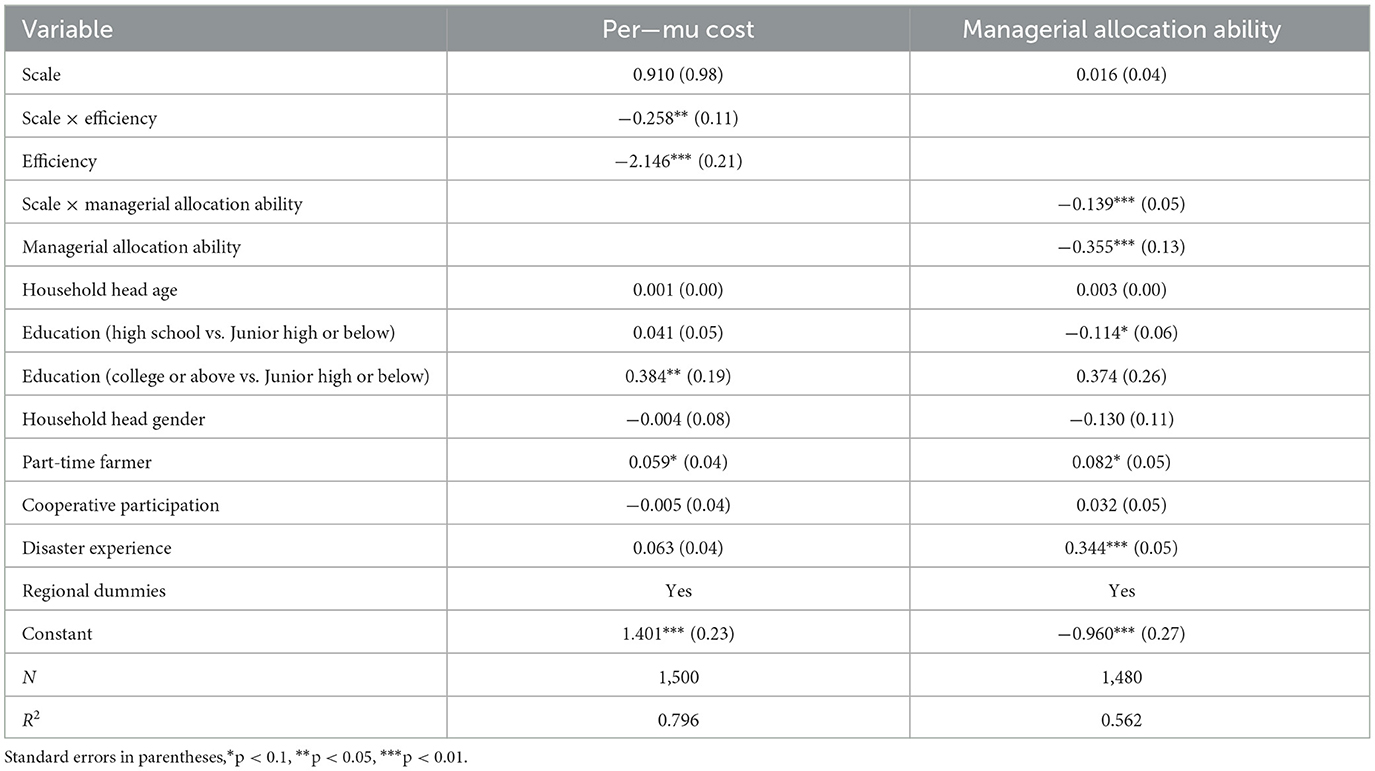- 1College of Economics and Management, Nanjing Agricultural University, Nanjing, China
- 2Business School, Hunan First Normal University, Changsha, Hunan, China
Introduction: This study extends prior work on economies of scale by introducing efficiency as a moderating factor in agricultural economies of scale. By incorporating regional heterogeneity, the paper provides a new framework for understanding scale expansion in diverse agricultural environments, offering insights that can guide policies for more sustainable agricultural production.
Methods: The study examines how efficiency affects economies of scale in corn production using data from the China Rural Revitalization Survey (CRRS). A double stochastic frontier model with two-stage least squares is employed to isolate efficiency loss and address scale endogeneity via instrumental variables.
Results: The results reveal a significant U-shaped relationship between land operating scale and unit production cost. Insufficient efficiency under expanded scale increases costs, highlighting the need for sustainable resource allocation to balance productivity and long-term agricultural viability. Furthermore, efficiency moderates economies of scale, exhibiting regional heterogeneity.
Discussion: The policy implications include optimizing factor allocation through tiered management training, improving the land transfer market to reduce transaction costs, and deploying digital infrastructure and cross-regional service alliances to mitigate regional disparities. This study provides evidence on the role of managerial ability in efficiency, which optimizing economies of scale, demonstrating how resource efficient practices reduce input waste and align agricultural growth with ecological preservation. This study provides evidence that managerial ability in efficiency not only lowers production costs but also reduces resource waste, thereby supporting the dual goals of economic viability and environmental sustainability in agriculture. These insights inform policies to scale farming operations without compromising ecological integrity.
1 Introduction
Understanding the role of efficiency in agricultural economies of scale is essential for building sustainable and efficient food production systems. By identifying how cost reductions can be achieved through better farm management, this study provides insights into optimizing agricultural production in a way that supports long-term food security and resource efficiency. With the acceleration of agricultural modernization in China, large-scale operations have been regarded as an important means to reduce production costs and enhance international competitiveness. However, the persistent rise in corn production costs, together with the complex relationship between scale expansion and cost control, remains a focal point for both academics and policymakers. While large-scale operations are viewed as a crucial approach to reducing production costs and boosting international competitiveness (Huang and Ding, 2016), the empirical relationship between scale expansion and cost control exhibits significant complexity. For instance, Tauer and Mishra (2006), through an empirical analysis of the U.S. dairy industry, found that the high costs of small-scale farms primarily stem from efficiency losses rather than technological disadvantages, whereas the cost advantages of large-scale farms are realized through reductions in allocative inefficiency. Data indicate that between 2013 and 2020, the number of farmers with an operating scale exceeding 3.3 mu increased by 42%, and the share of operating area rose from 20.7% to 28.5% (Zhang et al., 2017). This study addresses three key research questions: (1) How does efficiency influence economies of scale in grain production? (2) To what extent does efficiency moderate the relationship between farm size and production costs? (3) How do regional differences shape the impact of efficiency on cost? By answering these questions, the study provides new insights into sustainable agricultural scaling.
By answering these questions, the study provides new insights into sustainable agricultural scaling. In addition to economic benefits, managerial ability plays a pivotal role in mitigating agriculture's environmental footprint. For example, precise input allocation reduces nitrogen leaching into waterways, addressing eutrophication—a critical issue in regions like the Yangtze River Basin. By bridging scale economies with ecological stewardship, this study advances a holistic framework for sustainable intensification.
Traditional theories posited that economies of scale lower unit costs by spreading fixed costs (Alvarez and Arias, 2003; Hall and Leveen, 1978). However, recent evidence shows that both technical and allocative efficiencies constrain this effect (Tauer and Mishra, 2006; Mosheim and Lovell, 2009). Note that factor price distortions induce allocative inefficiency, offsetting technical efficiency corns. Li et al. (2021) found that for Chinese corn growers, scale expansion reduces frontier costs, technical inefficiency losses negate 40% of the benefits. Moreover, economies of scale are non-linear and largely depend on efficiency, resource allocation, and market conditions (Zhou et al., 2020); Henderson (2020) found that management differences explain 62% of this non-linearity. Strong management optimizes production factors and reduces inefficiency (Summer, 2014), whereas weak management leads to misallocation and cost rebounds (Zhang et al., 2017). Allocative inefficiency, driven by asymmetric information and inadequate socialized services (Zhang J. et al., 2022; Zhang et al., 2024), can be mitigated by improved management (Chavas, 2001). However, a unified mechanism linking efficiency and scale remains unresolved (MacDonald et al., 2007).
Promoting the transition toward economies of scale in grain production is a key concern for academics and policymakers. Land transfers, optimize farmland allocation and boost total factor productivity by affecting employment and technology adoption (Gai et al., 2023). Xu et al. (2024) analyzed scale effects from both farm- and plot-level perspectives, clarifying the “scale–yield” relationship based on arable land availability and input characteristics. Ma (2018) demonstrated that large-scale corn production in Hebei yields high technical efficiency, returns to scale above unity (1.01), and lower costs per mu, indicating that advanced technology can enhance economies of scale within an optimal range. Government subsidies and infrastructure investments further reduce costs and promote scale expansion efficiency, which encompasses production planning, resource allocation, technology promotion, and risk management (Triebs and Kumbhakar, 2018), is pivotal in integrating these factors. Nonetheless, the intrinsic mechanisms linking efficiency and economies of scale remain underexplored; this research addresses this gap by providing new theoretical and practical guidance for sustainable corn production.
Endogeneity is a critical concern for the scale variable. Efficient farmers tend to expand via land transfers (Chen et al., 2021), while exogenous shocks, such as policy subsidies, can distort scale decisions, biasing OLS estimates. Foster and Rosenzweig (2019) demonstrated that using the regional fragmentation index overestimated scale effects by 31%. To mitigate such bias, this study employs the scale of owned land and its interaction with efficiency as instrumental variables (Chavas, 2001), acknowledging that owned land is influenced by historical institutions and family endowments (Zhang et al., 2017). Instrumental variable and panel data models (Zhang et al., 2024) are used to address these endogeneity issues.
Although economies of scale have been widely studied, three limitations remain: a primary focus on technical efficiency, reliance on a single instrumental variable that neglects interaction effects, and predominantly subjective measures of efficiency. This paper addresses these issues by employing farmer data from the China Rural Revitalization Survey (CRRS) and a two-stage least squares (2SLS) model based on a modified Cobb-Douglas production function. The study decomposes frontier, technical inefficiency, and allocative inefficiency costs to reveal the moderating pathway of efficiency on economies of scale. Its contributions are threefold: theoretically, it establishes an integrated “scale–efficiency–economies of scale” framework emphasizing allocative efficiency; methodologically, it introduces dual instrumental variables to resolve joint endogeneity; and practically, it demonstrates how socialized services can compensate for management shortcomings, thereby informing differentiated policy design.
The rest of the paper is organized as follows. Section 2 describe the primary system approach and data. Section 3 discusses the empirical results, and the final section presents the study's conclusions.
2 Methodology and data
2.1 The primal system approach
This study empirically investigates how farmers' efficiency influences economies of scale in corn production. The measurement of efficiency is based on calculating technical efficiency, a metric reflecting how well farmers utilize existing technology, through a specified production function, thereby assessing its status. To elucidate the transmission mechanism of efficiency on corn production costs, a combined theoretical and empirical approach is employed. Initially, the study builds on the Primal System Approach, a framework integrating production and cost analysis, construct a dual stochastic frontier model that incorporates both technical inefficiency and allocative inefficiency is constructed. Following Zhang et al. (2019), this study uses Technical Efficiency (TE) as a proxy for efficiency, which is calculated from the residuals of the Cobb-Douglas production function. This approach allows for a detailed assessment of how technical efficiency affects economies of scale in corn production:
Its expression is given by
Here, yj denotes output; xj represents inputs (e.g., labor, seeds, fertilizers); aj captures technological parameters, thereby reflecting the influence of technological level on production; v is a normally distributed error capturing random shocks; Among these, pj denotes the cost share of the j-th input factor for the farmer; wj is the price of the j-th input factor for the farmer; and ξj can be interpreted as the allocative inefficiency parameter of input factor j relative to the baseline input factor.
Logarithmic transformation facilitates regression analysis to derive coefficients. It also distinguishes technical from allocative efficiency through first-order cost minimization (Atkinson and Dorfman, 2006) and cross-equation constraints (Kumbhakar, 2020). Building on the production function, we derive cost minimization conditions and analyze key inputs (labor, seeds, fertilizers) to estimate technical efficiency and generate kernel density plots. This method effectively elucidates the mechanism by which efficiency influences production.
We further validate economies of scale by first constructing a baseline regression model. The model is specified as follows:
In this study, Ci denotes the production cost per kilogram of corn for the i-th farmer, Si represents the production scale of the farmer, Xi is a vector of control variables—including household head age, household head education level, household head gender, whether the farmer is engaged in non-agricultural activities, and whether the farmer participates in a cooperative, These control variables are used to account for other factors affecting production costs. β0 is the constant term, β1 are the parameters to be estimated, and νi is the random error term. To more comprehensively capture any potential non-linear relationship between scale and cost, as shown in the equation below, we further construct a model that includes a squared term for scale to capture the direction and magnitude of its impact on corn production costs.
During the estimation process, the significance and sign of each variable's coefficient are analyzed based on the regression results to determine whether the effects of scale and the control variables on cost align with economic theory. A significant non-linear relationship exists between scale and cost: as scale expands, costs initially decrease rapidly (as reflected by a negative coefficient on the linear scale term), and then the rate of cost reduction gradually slows (as indicated by a positive coefficient on the squared scale term). This not only further verifies the existence of economies of scale but also suggests that the effect of economies of scale is not infinitely increasing; rather, it follows a U-shaped pattern, indicating an optimal range of scale. Combining the above models and formulas allows for a systematic analysis of the impact of farmers' managerial capacity on the unit production cost of corn. It also explores the roles of technical efficiency loss and allocative efficiency loss in this relationship.
To address potential endogeneity of production scale, we employ a dual instrumental variable strategy (Huang and Ding, 2016) using the farmer's owned land area and its interaction with efficiency as instruments. The former is exogenous (Stock and Yogo, 2005), and the latter captures the moderating effect of efficiency. A system of simultaneous equations is estimated via two-stage least squares (2SLS). The first-stage regression is specified as:
After successfully obtaining the predicted values of production scale in the first-stage regression, we move on the second-stage regression. Let denote the predicted production scale obtained in the first stage; this value replaces the original endogenous production scale variable, thereby effectively mitigating the interference of endogeneity on the estimation results.
To further examine the effect of efficiency on corn production costs, we construct a cost model that incorporates efficiency, production scale, and their interaction:
In this specification, efficiency Mi, scale , and their interaction term are used as the core explanatory variables to analyze the effect of efficiency on costs at different scales. This two-stage estimation approach effectively circumvents the endogeneity issues associated with Si and Mi, thereby yielding unbiased estimates of the impact of efficiency, scale, and their interaction on corn production costs. To ensure the robustness of the findings, three robustness checks are implemented: (1) Replacing the dependent variable by using cost per mu instead of cost per unit of output, and substituting allocative efficiency loss for technical efficiency loss as a proxy for efficiency; (2) Altering the quantification method for efficiency by constructing a management effectiveness index and computing the deviation from the mean; (3) Conducting regional estimations to test for heterogeneity between the eastern, central, and western regions. All tests pass the Hausman test, thereby confirming the reliability of the core conclusions.
2.2 Data
The data are drawn from the China Rural Revitalization Survey (CRRS), covering 10 provinces in 2020. A stratified random sampling method was used, selecting counties based on GDP and villages based on economic level (Zhang L. et al., 2022). The final sample consists of 3,511 households, including 1,515 corn-producing households. Implicit costs, such as the opportunity cost of household labor, were calibrated using the methodology outlined in the Compilation of National Agricultural Product Cost and Revenue Data by the National Development and Reform Commission (Li et al., 2021). Key variables include land scale, with an average of 20.05 mu and a standard deviation of 76.68, and production costs, with an average of 1,775.8 yuan per mu. Detailed descriptive statistics are provided in Table 1. The distribution of production scale exhibits a pyramid pattern: 78.5% of farmers operate < 10 mu, accounting for only 13.1% of the total operating area, whereas farmers operating more than 100 mu represent 8.2% of the sample yet cover 71.3% of the cultivated land. This distribution is consistent with the land concentration trend reported by Zhang J. et al. (2022). Outliers, representing 2.1% of the sample, were trimmed using Tukey's method (Chen et al., 2021), and province fixed effects were included to control for regional heterogeneity. Table 1 further presents additional descriptive statistics, including an average output of 9,543.06 kg with a standard deviation of 30,431.97 kg, land input of 20.05 mu with a standard deviation of 76.68 mu, and cost variables such as land rent, labor wage, fertilizer price, and seed price.
3 Results and discussion
3.1 The impact of efficiency on economies of scale: baseline results
First, we compute efficiency using the Cobb–Douglas (CD) production function method to estimate farmers' Technical Efficiency (TE). The inputs of land, labor, seeds, and fertilizers all have a significant positive impact on corn output. According to the production function regression results in Table 2, the coefficient for land input is 0.882, which is significantly higher than that for the other inputs, indicating that land input plays a decisive role in corn production. The coefficients for labor, seeds, and fertilizers are 0.030, 0.080, and 0.108, respectively, and are all statistically significant. The kernel density estimation of technical efficiency also indicates an average value of 0.606, implying that, farmers have a potential output growth space of 39.4%. This suggests that enhancing efficiency could reduce input waste and promote sustainable intensification of corn production. There is considerable variation in technical efficiency among farmers, with the highest observed efficiency at 0.956 and the lowest at 0.002. This reflects significant differences in production efficiency among farmers. Land input is one of the key variables determining corn output, emphasizing the need for sustainable land management practices to balance productivity with long-term soil health and ecological preservation. In comparison with similar studies, although some report slightly higher values, substantial variation among farmers is also observed, with the highest technical efficiency reaching 0.92 and the lowest 0.05. Such differences may arise from variations in the agricultural production environment, farmers' levels of technical training, and production and management practices. One study found an average technical efficiency close to our result, and similarly showed notable dispersion in efficiency among farmers. The similarities and differences in these results provide a broader perspective on the current state and heterogeneity of farmers' efficiency, suggesting that further research is needed to explore the deeper factors affecting farmers' technical efficiency in order to develop more effective improvement strategies. Overall, the computed results on efficiency in this study provide important baseline data and analytical evidence for a deeper exploration of the complex relationship between efficiency and economies of scale among farmers. Comparisons with related studies enrich our overall understanding of this field and help promote further research.
Additionally, this paper further examines economies of scale. Based on the Two-Stage Least Squares (2SLS) method and the baseline regression results, columns (1) and (2) indicate that there is a significant negative relationship between production scale and unit production cost, with a coefficient of −0.385 significant at the 1% level. In Table 3, column (4) shows that the estimated coefficient for production scale is −0.339, significant at the 1% level, indicating that an expansion in production scale contributes to reducing the unit production cost. Meanwhile, the estimated coefficient for the squared term of production scale is 0.037, significant at the 5% level. The positive coefficient shows that the relationship between production scale and unit production cost is U-shaped. In other words, in the early stages of scale expansion, unit production cost declines; however, once a certain critical point is exceeded—due to inadequate efficiency and declining resource allocation efficiency—the cost begins to rise. Furthermore, the regression results without considering control variables show that the estimated coefficient for the first-order (linear) term of production scale is −0.385, significant at the 1% level, while after adding the quadratic term, the coefficient is 0.062, significant at the 1% level. This also confirms that there exists a significant U-shaped relationship between production scale and unit production cost.
It is particularly noteworthy that the estimated coefficient for the squared term of production scale is 0.062, significant at the 1% level. This result indicates that the relationship between production scale and unit production cost is not simply linear but exhibits a typical U-shaped pattern. In the early stage of scale expansion, factors such as fixed cost sharing and increased bargaining power in procurement cause costs to decline rapidly. However, once the scale exceeds a certain critical point, factors such as managerial capacity bottlenecks, declining resource allocation efficiency, and rising coordination costs lead to gradually rising costs. This finding is consistent with many previous studies on agricultural economies of scale and reminds us that in studying agricultural economies of scale, one should not focus solely on the effect of scale expansion but must also consider the complex accompanying factors.
3.2 The impact of efficiency on economies of scale: using 2SLS method
Validity tests reported in Table 4 confirm the robustness of the instrumental variables. The table presents the estimated coefficient for the owned land area (Z) as 0.095, which is statistically significant at the 1 percent level.
Initially, the regression did not consider the potential endogeneity of the scale variable and employed Ordinary Least Squares (OLS). However, to address this endogeneity, we re-estimated the regression using the instrumental variable method (Two-Stage Least Squares, 2SLS). The 2SLS method involves two stages: in the first stage, the scale variable is regressed on the instrumental variable; in the second stage, the analysis shows that the scale variable still has a negative impact on the cost per kilogram of corn, albeit with a coefficient different from that obtained via OLS. This suggests that the OLS coefficient, which does not account for instrumental variables, might be problematic. Therefore, subsequent analysis should adopt the instrumental variable regression results, which are more accurate. This design is better suited to capturing the dynamic moderating effect of efficiency during scale expansion compared to traditional single-instrument methods, such as those proposed by Fan and Chan-Kang (2005). Methodologically, it is consistent with the “joint endogeneity” framework proposed by Kumbhakar (2020).
These findings are similar to those of Tauer and Mishra (2006) for U.S. dairy farms, although the turning point in our study is significantly lower than that in developed countries, possibly due to insufficient fixed asset investment under China's smallholder agricultural conditions. Specifically, scale expansion leads to an annual per-mu cost reduction of 2.7%, primarily attributable to variable cost savings from outsourced machinery services (Zhang J. et al., 2022). However, as scale increases further, rising coordination costs lead to diminishing marginal returns, consistent with the findings from Henderson's (2020) study of Indian farmers.
We now focus on the relationship between efficiency and cost. It is evident that when efficiency is enhanced, costs drop rapidly. In other words, as efficiency increases, unit costs show a marked decline. The data on firm that under a constant scale, if efficiency improves, the corresponding outcomes—such as the cost of corn production—will decrease. Similarly, under constant efficiency, an increase in scale also results in lower costs. Several perspectives exist to interpret this phenomenon. From the viewpoint that increasing efficiency under a fixed scale leads to lower outcomes, it is clear that efficiency, rather than the scale factor, plays the key role. Therefore, while at first glance, we observe an economies of scale effect—that is, costs decline as scale increases—a deeper analysis reveals that the underlying driving force is actually efficiency.
The moderating effect of efficiency is both statistically significant and robust, as shown in Table 5. The coefficient for scale is −0.074 and becomes insignificant, while the interaction term between efficiency and scale remains negative. This suggests that scale, by itself, does not have a significant effect on costs; rather, it is the efficiency that is attached to the scale which influences the relationship between scale and cost. In other words, as production scale expands, many factors change simultaneously. For example, when farmers expand their operational scale, numerous elements are dynamically evolving. Without controlling for these related factors, one might erroneously attribute all changes solely to scale, whereas in reality, these changes are not directly linked to scale—that is, scale itself is not the active factor. What truly matters is to separate the effects of other factors from those of scale.
Moreover, the moderating role of efficiency on economies of scale is evident from the regression results reported in Table 5. The estimated coefficient for the interaction term between production scale and efficiency is −0.266, statistically significant at the 5% level. This negative relationship demonstrates that stronger efficiency enhances the cost-reducing effect of scale expansion. Specifically, the estimated coefficient for the interaction term between production scale and efficiency is −0.258, statistically significant at the 5% level, while the coefficient for efficiency itself is −2.125, statistically significant at the 1% level. These findings indicate that farmers with greater efficiency are more effective in mitigating cost increases associated with scale expansion. This aligns with the stochastic frontier analysis results reported by, which demonstrate that efficiency not only enhances technical efficiency but also mitigates allocative distortions, thereby supporting long-term agricultural viability through optimized resource use.
To ensure the reliability and accuracy of the results, this section further elaborates on the analysis conducted after the benchmark regression using the Two-Stage Least Squares (2SLS) method. As shown in Table 5, in the first-stage regression, the estimated coefficient of self-owned land size as an instrumental variable is 0.051, which is significant at the 1% confidence level. This indicates that self-owned land size is not correlated with efficiency, thereby satisfying the relevance requirement of instrumental variables. Since self-owned land is fundamental to farmers' production activities and is unrelated to efficiency in this context, the strict test for weak instrumental variables clearly rejects the null hypothesis of weak instruments. This confirms that the chosen instrumental variable is both strong and effective, laying a solid foundation for subsequent precise estimation.
In the second-stage regression, the estimated coefficient of the predicted production scale in Table 5 is −0.09, with a standard error of 0.08, and is not significant. The interaction term between efficiency and scale is −0.258, which is significant at the 1% confidence level. This robustly validates the existence of economies of scale and demonstrates the significant moderating effect of efficiency on scale. In other words, the expansion of production scale does indeed significantly reduce the cost per kilogram of corn, and the results remain robust even after addressing endogeneity issues using the 2SLS method. This further confirms that the observed effect of efficiency on economies of scale is genuine rather than an artifact of endogeneity. Although there are some differences in absolute coefficient values compared to the baseline regression, the negative trend remains consistent, and the significance of efficiency indicates the stable existence of economies of scale.
The analysis of control variables also reveals several significant conclusions. First, the role of education in fostering sustainable technology adoption and mitigating environmental trade-offs in agricultural practices is evident. Although age does not directly impact production costs—evidenced by an estimated coefficient of 0.001 for household head age in Table 5, which is not significant—it suggests that, ceteris paribus, an increase in age may slightly raise production costs. This aligns with previous studies indicating that older household heads may struggle to adopt new technologies and management practices promptly. It may also suggest that older farmers tend to maintain smaller-scale operations, with a weaker synergy between efficiency and scale, possibly due to delayed technology adoption or a higher risk aversion tendency. The heterogeneity effect of education level is particularly pronounced. Household heads with a university degree or higher have significantly higher production costs than those with lower educational levels. This variable has a coefficient of 0.387 in the benchmark regression and is significant at the 5% confidence level, which contradicts traditional expectations from human capital theory. However, when combined with the second-stage results, it is observed that the expansion coefficient for highly educated household heads is 0.039, and the coefficient for efficiency improvement is −0.028, neither of which is significant. This indicates no apparent advantage in these aspects, suggesting that highly educated individuals may allocate their knowledge capital to non-agricultural sectors, leading to a bias in agricultural technology selection.
The moderating effect of production organization methods exhibits heterogeneous characteristics. Part-time farmers display a significant cost disadvantage in the benchmark regression, with a part-time coefficient of 0.060, significant at the 10% confidence level. This suggests that part-time farmers often face higher corn production costs. In the interaction equation, the coefficient decreases to 0.084, remaining significant at the 10% confidence level. This may be explained by the dual-channel impact of part-time farming on economies of scale: it directly increases unit production costs while indirectly suppressing efficiency gains by weakening the moderating effect of efficiency on scale. The influence of cooperative participation is more nuanced. Although it does not directly affect production costs—the benchmark regression coefficient is −0.004 and not significant—the expansion coefficient is 0.166, significant at the 10% confidence level, while efficiency improvement is 0.100, significant at the 5% confidence level. Indicating a significant role in promoting economies of scale. The unique nature of cooperative services, where the “scale-promoting, efficiency-neutral” characteristic may stem from the dual nature of cooperative service functions: while expanding operational scale, increased internal transaction costs offset the efficiency gains from technology promotion.
In summary, the detailed analysis of the data in Table 5, combined with rigorous research methods, highlights the critical role of efficiency in economies of scale and its interaction with other factors. By improving efficiency and lowering unit costs, farmers can achieve more sustainable production systems that support long-term food availability. Reducing production inefficiencies ensures that food prices remain stable, benefiting both producers and consumers, particularly in regions with high agricultural costs. Our analysis demonstrates that improving management efficiency and lowering unit production costs are pivotal for achieving more sustainable production systems. Lower unit costs enhance the financial viability of food production, reducing the risk of farm closures and ensuring long-term food supply stability. Moreover, by minimizing inefficiencies in production, cost savings help maintain stable prices for staple crops, thereby indirectly benefiting consumers. The observed regional differences in economies of scale further highlight potential disparities in food availability, emphasizing the need for policy designs that account for such inequalities. Efficient operations play a pivotal role in reducing input waste by ensuring that resources—such as fertilizers and labor—are used in an optimized manner, thereby minimizing inefficiencies. This heightened efficiency contributes to lower production costs, which in turn supports the long-term financial sustainability of farming enterprises and alleviates the pressure to pursue unsustainable expansion. By enhancing operational efficiency, farmers can maintain their viability without relying excessively on external subsidies or resorting to environmentally detrimental practices, ultimately fostering a more balanced and resilient agricultural system.
3.3 Heterogeneity analysis
Regional heterogeneity analysis reported in Table 6 presents the regional heterogeneity results for Northeast China, East China, Central South China, Southwest China, and Northwest China. The results reveal significant spatial differences in the impact of efficiency on agricultural economies of scale, where the estimated coefficient β is −0.750, compared to the Northwest with coefficient β is −0.148. This difference may be attributed to two factors. First, the relatively mature agricultural industrial system and higher level of mechanization in the more efficient regions enable efficiency to coordinate production factors more effectively, maximizing economies of scale. Second, farmers in the Western regions are more dependent on non-agricultural employment, and their agricultural operations are often part-time due to weaker agricultural infrastructure. This limits the effective utilization of efficiency and reduces the marginal returns on management investments that would otherwise promote economies of scale. These findings are consistent with the cross-national comparative conclusions of Bravo-Ureta et al. (2020), which indicate that regional differences in infrastructure and labor markets significantly influence the pathways through which economies of scale are achieved.
The variation in the impact of efficiency across regions underscores the importance of region-specific policies for sustainable food production. While some areas benefit more from economies of scale, others face structural barriers that hinder efficiency improvements. Ensuring equitable access to agricultural infrastructure and management training can help address these disparities and support sustainable food systems. Regarding farmer characteristics play a significant role in cost reduction. For instance, the Eastern and Northeastern regions exhibit stronger cost reductions, possibly due to better institutional support or more advanced farm structures. In contrast, Western regions may struggle to realize economies of scale due to weaker infrastructure, necessitating more targeted policy interventions. Part-time farmers, whose attention is divided between multiple occupations, often do not fully exert efficiency in corn production. The data show that the economies of scale effect is significantly weaker for part-time farmers compared to full-time farmers. This is because part-time involvement prevents farmers from fully dedicating themselves to agricultural production, leading to deficiencies in resource allocation and process control, which in turn impede effective cost reduction. These regional disparities reflect divergent sustainability challenges. In Northwest China, where soil degradation and water scarcity are acute, weaker managerial ability exacerbates over-cultivation risks. Conversely, Northeastern regions with robust infrastructure can leverage managerial practices to adopt no-till farming, reducing soil erosion. Policy interventions must therefore prioritize region-specific solutions, such as drought-resistant crop training in the West and subsidized conservation tillage equipment in the Northeast.
3.4 Robustness tests
To ensure the reliability and robustness of the results, multiple tests were conducted to confirm consistency with previous studies. In terms of variable substitution, the regression was re-estimated as reported in Table 7, replacing the cost per kilogram of corn with the cost per mu and substituting management allocation capacity for efficiency, measured as technical efficiency. The results presented in Table 7 indicate that the estimated coefficient for the interaction term between scale and management allocation capacity is −0.139, statistically significant at the 5% level. Although the numerical values of key indicators, such as the scale coefficient, exhibit slight variations, the overall trend remains consistent. This indicates that our conclusions do not depend on the choice of specific variables and exhibit strong stability. The results indicate that the promoting effect of efficiency is consistently present across different scale groups, with the core variable relationships remaining substantively unchanged, further confirming the reliability of our results. Additionally, we compared results obtained using different estimation methods such as OLS and SFA. The findings under these different methods consistently support our main conclusions regarding the impact of efficiency on economies of scale, thereby confirming the robustness of our research from multiple dimensions. Through these rigorous testing procedures, we are confident that our results accurately reflect the intrinsic relationship between efficiency and economies of scale, providing strong support for both agricultural economic research and practical applications.
4 Conclusions
4.1 Concluding remarks
This study finds that improved efficiency significantly reduces unit production costs, helping farmers optimize input use and achieve cost-effective production while advancing resource-efficient and environmentally sustainable agricultural practices. These efficiency gains contribute to a more sustainable food system by reducing economic pressures that may otherwise drive inefficient land use or input over-application. Efficiency reduces input waste—such as minimizing overuse of fertilizers or labor inefficiencies—thereby lowering production costs and enhancing long-term financial sustainability for farmers. By reducing the pressure to pursue unsustainable expansion, efficiency enables farmers to remain economically viable without relying on excessive external subsidies or engaging in environmental exploitation.
This study investigates the influence mechanism between efficiency and economies of scale from the perspective of efficiency. It demonstrates the relationship between scale expansion and cost efficiency, a dimension often overlooked in prior analyses of agricultural economies of scale. By integrating regional heterogeneity into the framework, the research offers a nuanced understanding of how contextual factors shape the benefits of management practices, distinguishing itself from homogeneous approaches that assume uniform effects across regions. This study bridges empirical evidence with practical implications, highlighting its relevance to the special issue's focus on innovative strategies for resilient and efficient food systems.
4.2 Policy recommendation
Improving land transfer markets and strengthening digital agriculture infrastructure can enhance both efficiency and sustainability. Improving land transfer markets prevents fragmentation, promoting efficient land use while reducing risks of soil degradation. Digital infrastructure not only lowers costs but also enables precision agriculture, minimizing overuse of water and fertilizers to mitigate environmental harm. These improvements ensure that farmland is allocated to maximize productivity while minimizing ecological footprints, thereby supporting a transition toward more resilient and resource-efficient food production systems. Such policies align agricultural growth with environmental sustainability goals.
To achieve these goals, it is essential to design land transfer policies that reduce transaction costs and ensure efficient land use, thereby preventing fragmentation that can lead to lower productivity. Additionally, land transfer policies should incorporate environmental safeguards, such as mandating soil health assessments before transfers to prevent over-exploitation—critical in ecologically fragile regions like the Northwest. Moreover, enhancing digital infrastructure can improve information access and reduces decision-making inefficiencies, supporting precision management and reducing unnecessary input use. Furthermore, tiered management training programs can equip farmers with best practices in resource allocation, preventing excessive input costs and waste. Prioritize tiered training programs that address region-specific sustainability challenges: Western regions require modules on drought-resistant cropping and soil conservation, while Eastern provinces benefit from precision irrigation training, as evidenced by their differing environmental pressures and infrastructure capacities. Collectively, these policy measures provide a comprehensive framework for advancing sustainable agriculture while simultaneously promoting efficiency.
Data availability statement
The original contributions presented in the study are included in the article/supplementary material, further inquiries can be directed to the corresponding author.
Author contributions
NZ: Conceptualization, Data curation, Formal analysis, Methodology, Software, Writing – original draft, Writing – review & editing. QZ: Project administration, Data curation, Investigation, Software, Writing – review & editing. XG: Conceptualization, Investigation, Software, Supervision, Writing – review & editing.
Funding
The author(s) declare that no financial support was received for the research and/or publication of this article.
Conflict of interest
The authors declare that the research was conducted in the absence of any commercial or financial relationships that could be construed as a potential conflict of interest.
Generative AI statement
The author(s) declare that no Gen AI was used in the creation of this manuscript.
Publisher's note
All claims expressed in this article are solely those of the authors and do not necessarily represent those of their affiliated organizations, or those of the publisher, the editors and the reviewers. Any product that may be evaluated in this article, or claim that may be made by its manufacturer, is not guaranteed or endorsed by the publisher.
References
Alvarez, A., and Arias, C. (2003). Diseconomies of size with fixed efficiency. Am. J. Agric. Econ. 85, 134–142. doi: 10.1111/1467-8276.00108
Atkinson, S. E., and Dorfman, J. H. (2006). Bayesian measurement of productivity and efficiency in the presence of environmental bads. J. Econom. 133, 231–250. doi: 10.1016/j.jeconom.2005.06.007
Bravo-Ureta, B. E., Amador, F. J., and Solís, D. (2020). Technical and allocative efficiency in agriculture: a meta-analysis. Agricult. Econ. 51, 359–373. doi: 10.1111/agec.12560
Chavas, J-. P. (2001). “Structural change in agricultural production: Economics, technology and policy,” in Handbook of Agricultural Economics (Vol. 1), 263–285. doi: 10.1016/S1574-0072(01)10008-3
Chen, X., Huang, Q., and Luo, R. (2021). Land fragmentation and agricultural productivity: evidence from China. Food Policy. 103:102044. doi: 10.1016/j.foodpol.2021.102044
Fan, S., and Chan-Kang, C. (2005). Is small beautiful? Farm size, productivity, and poverty in Asian agriculture. Agricul. Econ. 32, 135–146. doi: 10.1111/j.0169-5150.2004.00019.x
Foster, A., and Rosenzweig, M. (2019). Are there too many farms in the world? Labor-market transaction costs, machine capacities, and optimal farm size. [NBER Working Paper No. 25952)]. National Bureau of Economic Research. Available online at: https://www.nber.org/papers/w25952
Gai, Q., Li, C., Zhang, W., and Shi, Q. (2023). From smallholder operation to scale operation: land transfer and agricultural production efficiency. Econ. Res. 58, 121–138. doi: 10.19361/j.er.2023.05.08
Hall, B. F., and Leveen, E. P. (1978). Farm size and economic efficiency: the case of California. Am. J. Agric. Econ. 60, 589–600. doi: 10.2307/1240243
Henderson, H. (2020). Efficiency and scale economies in Indian agriculture. J. Dev. Econ. 147:102532. doi: 10.1016/j.jdeveco.2020.102532
Huang, J., and Ding, J. (2016). Institution innovation and policy support to facilitate small-scale farming transformation in China. Agricult. Econ. 47, 227–237. doi: 10.1111/agec.12309
Kumbhakar, S. C. (2020). A generalized efficiency decomposition model. J. Product. Anal. 54, 109–125.
Li, F., Zhang, K., Ren, J., Yin, C., Zhang, Y., and Nie, J. (2021). The paradox of scale: evidence from Chinese maize farmers. Agric. Syst. 192:103202. doi: 10.1016/j.agsy.2021.103202
Ma, J. (2018). Evolution, Driving Forces, and Efficiency of Farmers' Business Scale. Beijing: Economic Management Press.
MacDonald, J. M., McBride, W. D., O'Donoghue, E., Nehring, R. F. F., Sandretto, C., and Mosheim, R. (2007). Profits, costs and the changing structure of dairy farming. USDA Econ. Res. Rep. 47:28. doi: 10.2139/ssrn.1084458
Mosheim, R., and Lovell, C. A. K. (2009). Scale economies and inefficiency of U.S. dairy farms. Am. J. Agricult. Econ. 91, 777–794. doi: 10.1111/j.1467-8276.2009.01269.x
Stock, J. H., and Yogo, M. (2005). “Testing for weak instruments in linear IV regression,” in Identification and Inference for Econometric Models (Cambridge: Cambridge University Press), 80–108.
Summer, D. A. (2014). American farms keep growing: size, productivity, and policy. J. Econ. Perspect. 28, 147–166. doi: 10.1257/jep.28.1.147
Tauer, L. W., and Mishra, A. K. (2006). Can the small dairy farm remain competitive in US agriculture? Food Policy 31, 458–468. doi: 10.1016/j.foodpol.2005.12.005
Triebs, T. P., and Kumbhakar, S. C. (2018). Management in production: from unobserved to observed. J. Product. Anal. 49, 111–121. doi: 10.1007/s11123-018-0526-x
Xu, Z., Zhang, D., and Cheng, B. (2024). The logic of large-scale farmland operation for ensuring China's food security: an analysis based on the dual economies of scale of farm households and land plots. Manage. World 40, 45–60. doi: 10.19744/j.cnki.11-1235/f.2024.0059
Zhang, J., Hou, G., and Xing, L. (2024). The impact of the level of socialized agricultural machinery services on farmers' production efficiency: a case study of corn growers in Inner Mongolia. Chin. J. Agricult. Mach. Chem. 45, 123–130.
Zhang, J., Li, S., Wang, Y., and Chen, H. (2022). Digital technology adoption and cost efficiency: evidence from grain farmers in China. Technol. Forecast. Soc. Change 176:121456. doi: 10.1016/j.techfore.2022.121456
Zhang, L., Zhong, H., Wei, B., Fan, J., Huang, J., Li, Y., et al. (2022). Establishing reference values for peripheral blood lymphocyte subsets of healthy children in China using a single platform. J. Immunol. Res. 2022:8351453. doi: 10.1155/2022/5603566
Zhang, X., Yu, X., Tian, X., Geng, X., and Zhou, Y. (2019). Farm size, inefficiency, and rice production cost in China. J. Prod. Anal. 52, 57–68. doi: 10.1007/s11123-019-00557-6
Zhang, X., Zhou, Y., and Yan, B. (2017). Farm operation scale and rice production costs: a case study from Jiangsu. Agricult. Econ. 84–94. doi: 10.13246/j.cnki.iae.2017.02.007
Keywords: efficiency, economies of scale, allocative efficiency, endogeneity treatment, regional heterogeneity
Citation: Zhang N, Zhang Q and Geng X (2025) Revisiting economies of scale: the moderating role of efficiency in corn farming. Front. Sustain. Food Syst. 9:1621038. doi: 10.3389/fsufs.2025.1621038
Received: 30 April 2025; Accepted: 02 June 2025;
Published: 27 June 2025.
Edited by:
Muhammad Asad Ur Rehman Naseer, Bahauddin Zakariya University, PakistanReviewed by:
Xiaoheng Zhang, Nanjing University of Aeronautics and Astronautics, ChinaHui Mao, Shaanxi Normal University, China
Copyright © 2025 Zhang, Zhang and Geng. This is an open-access article distributed under the terms of the Creative Commons Attribution License (CC BY). The use, distribution or reproduction in other forums is permitted, provided the original author(s) and the copyright owner(s) are credited and that the original publication in this journal is cited, in accordance with accepted academic practice. No use, distribution or reproduction is permitted which does not comply with these terms.
*Correspondence: Xianhui Geng, Z2VuZ3hoQG5qYXUuZWR1LmNu
 Nianning Zhang
Nianning Zhang Qing Zhang
Qing Zhang Xianhui Geng
Xianhui Geng